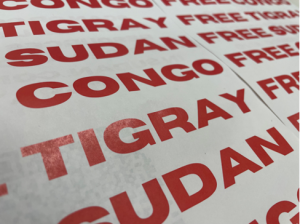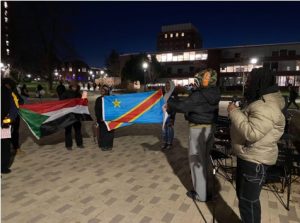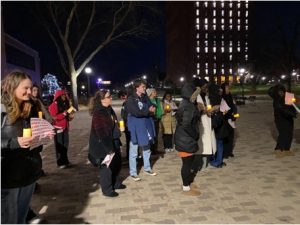On Thursday, Nov. 30, the African Students Association (ASA) at the University of Massachusetts Amherst held a vigil outside of the Student Union to “mourn the lives of the innocent people facing genocide across Africa,” the organization’s Instagram post said. The vigil lasted an hour and around 50 were in attendance.
Students held candles and posters provided by ASA. The posters said, “Free Sudan,” “Free Congo” and “Free Tigray” with resources on one side. Gatherers held up a Sudanese and Congolese flag as well.
The vigil was held for remembrance of the lives lost in Sudan, Tigray and the Democratic Republic of Congo.

The vigil began with an introduction from Bedphiny Deng, a biology major and ASA president. She discussed her goals as president and explained, “too many times the voices of Africans have been silenced or slaughtered for the sake of the world’s comfortability and growth.” As a Sudanese student, she added that the ability to obtain an education and gather for the vigil is “a blessing.”
According to the United Nations, an estimated 9,000 people were killed and 5.6 million were forced to flee their homes in Sudan. This a result of the ongoing conflict between the Sudanese Armed Forces (SAF) and Rapid Support Forces (RSF).
After two years of conflict, Ethiopia and Tigray agreed to a ceasefire in November 2022 following the death of an estimated half a million people. The country is currently facing an economic crisis as a result of the conflict.
The Democratic Republic of Congo (DRC) is facing an invasion and displacement of its
citizens in an attempt to mine resources. Additionally, they are suffering under attacks, rape and other killings by the Congolese rebel military group M23.
Junior biology major and Senior ASA Event Coordinator Leila Imani spoke about the conflicts occurring in DRC. She described the genocide of the Congolese people by the M23. Additionally, she explained the state of crisis in DRC as a result of ongoing mining for copper, gold and cobalt, displacing its citizens.

Imani explained that her father is as old as DRC independence and said, “he’s probably never going to see a truly free Congo.” She said it is important to be “raising awareness about these issues and making people care and making people do something now.”
Recycling phones, buying refurbished technology and using technology until they break were all ways Imani listed to combat the “modern slavery” occurring in Congo. “Nobody’s comfort is more important than the struggles of other people,” Deng added.
Imani acknowledged the essentiality of technology but urged people to use them reasonably until they are no longer functioning.
She described the Western exploitation of DRC by imperialist nations, destroying the homes and lives of Congolese citizens. She explained that these exploitations have affected every aspect of Congolese lives, in places like markets, schools and airports. Against the wills of the African people, imperialists are “attracted to Africa’s riches,” according to Deng.
Imani explained her personal story, still having family in DRC commenting that they never have “gotten to see a truly free Congo.”
“Just because a country has an Independence day doesn’t mean they are free.”
However, Imani hasn’t lost hope yet: “[With] raising awareness about these issues and making people care… hopefully I’ll see a free Congo even if my dad doesn’t.”
After a moment of silence for the lives lost in DRC, Deng spoke about the genocide in Tigray that has been “unaddressed for decades.” Border disputes, tensions and rights abuses were all things Deng listed that were impacting Tigrayan people.
Following the outbreak in November 2020 the Ethiopian federal government and Amhara forces have been seizing Tigrayan land after “long grievances against the Tigrayan people,” according to Deng. She added that Tigrayan citizens have suffered “arrest, detentions, killings, torture and ill treatment.”
She detailed that Tigrayan citizens have been deprived of humanitarian aid, including food, water and medicine. “It’s time that we advocate for them because their country will not advocate for them. This is a crime against humanity. This is a crime against black bodies,” Deng added.
Following a moment of silence for Tigray, Deng explained the destruction in Sudan as a result of the Sudanese armed forces and the RSF. She said Sudan has fallen victim to airstrikes and street battles, affecting “bridges to buildings to schools to homes.”

After the overthrowing of former Sudanese president Omar al-Bashir in 2019, Deng stated power was to be shared among the Sudanese people, following his 30 year dictatorship. She explained the resulting distortion of power, leading to the displacement of Sudanese people after these forces led militia assaults and bombings in neighborhoods, displacing and destroying homes.
As a result of a decades-long conflict in Darfur, an estimated 4,000 Sudanese citizens have been killed from April to August as a result of these forces. Deng explains that Sudanese families have lost access to food, water, shelter and have limited electricity. “This is a call for peace in Sudan.”
Deng visited Sudan last December and finds the current state of the country “very shocking.”
“Even though conflicts were not the best, it was still something decent. I was still able to see all these monuments, all these pillars of the identity of Sudan, and looking back with a blink of an eye, it’s all gone.”
“Sometimes I look back at pictures and videos and think, who knew? Who knew this would be the last time I would see this airport? Who knew that this was probably the last time having access to my family? No, this will be the last time being able to walk in a country that my parents always [glorified] and always talked about. Who knew?” she said.
She finds it difficult to see her family being displaced and hearing them move frequently, only for them to face abuses in their new locations. But she hasn’t lost hope yet: “It’s important for us to continue to be here, to raise awareness and to speak up and to break that silence.”
“Because we should no longer have to experience [what] we should have today.”
“Advocate for the people of Congo. Advocate for the people of Tigray. Advocate for the people [of] Sudan. We need it. We don’t have those voices. We don’t really have the power in numbers globally. But we urge you, as being our brothers and sisters in humanity, to have it for us,” Deng added.
When describing how UMass and its administration can bring awareness to these issues, ASA members said acknowledging and providing support and information would be of benefit. Kosi Igbobi, a public health sciences major, said, “we need to recognize all of the issues that are happening in the world.” Igbobi added that history classes’ curricula could be amended to reflect more about African history as well.
She suggested that the University send an email acknowledging and educating on these issues and potentially holding a larger-scale vigil. “Remember that black bodies matter. Africans matter. We’re all human at the day. Let’s come together and let’s show up,” she said.
Mahidhar Sai Lakkavaram can be reached at [email protected] and followed on X @Mahidhar_sl.
Abby Joyce can be reached at [email protected].





















